Events
On Wednesday March 14th, 2018 at 10.30 am Margaret de Vos van Steenwijk president of INLW, was invited to deliver a speech at the Parallel Event at CSW62. This Parallel Event was sponsored by “The Urban Diversity and Mobility Research Center of Taiwan (UDM)”. She was asked to give her opinion and ideas about “Women’s political participation” in the future.
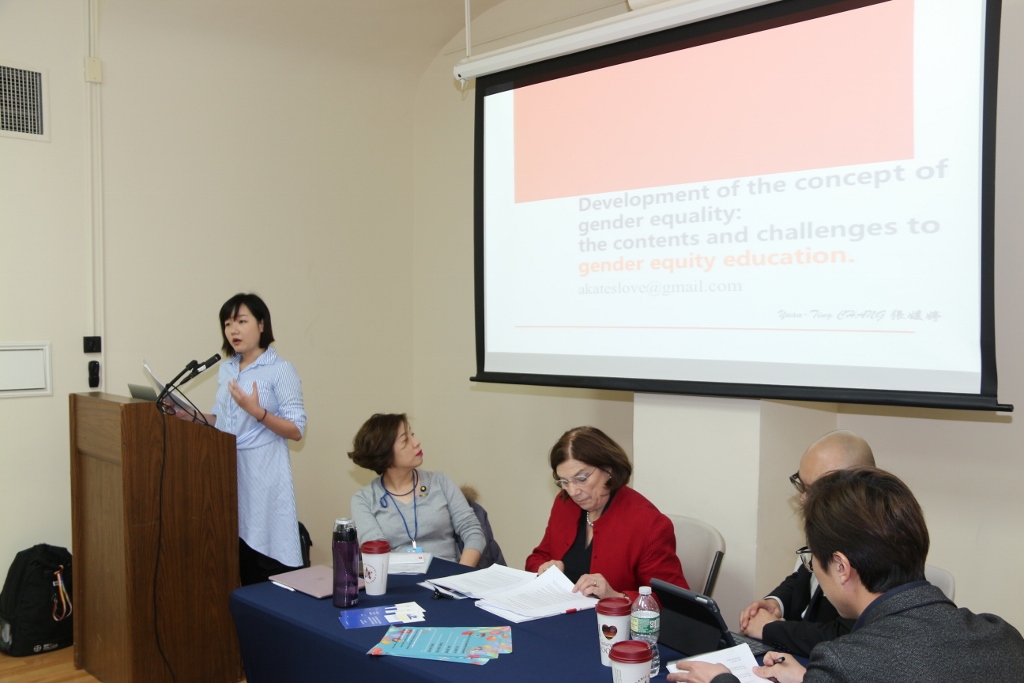 Other speakers were the Member of Parliament Mrs. Lin Ching-Yi who spoke of the situation in Taiwan for women. Also, Mr Shih, Mu-Min Ph.D. candidate University of Department of Asian Studies, Texas at Austin spoke of the gender progressiveness but very much with the eyes on the past. Gender is a word that does not exist in Taiwanese and so very often sex is put in its place which has a different meaning that is often overlooked in the policy papers and and discussions.
Other speakers were the Member of Parliament Mrs. Lin Ching-Yi who spoke of the situation in Taiwan for women. Also, Mr Shih, Mu-Min Ph.D. candidate University of Department of Asian Studies, Texas at Austin spoke of the gender progressiveness but very much with the eyes on the past. Gender is a word that does not exist in Taiwanese and so very often sex is put in its place which has a different meaning that is often overlooked in the policy papers and and discussions.
“How women make Cities smarter? Education, Empowerment and Policies. Through the improvement of education and more political participation of women we can see a change. Now there are 38% women in parliaments all over the world. Locally we find even more women in city councils and as aldermen. The females are more supportive of points such as gender equality and the endorsement of it. The gender equality is now integrated in the curriculum of health and physical education. Many school text books must be changed so that the existing gender stereotyping is taken out. They should for instance be illustrated in a gender equality friendly fashion.
[read more=”Read more” less=”Read less”]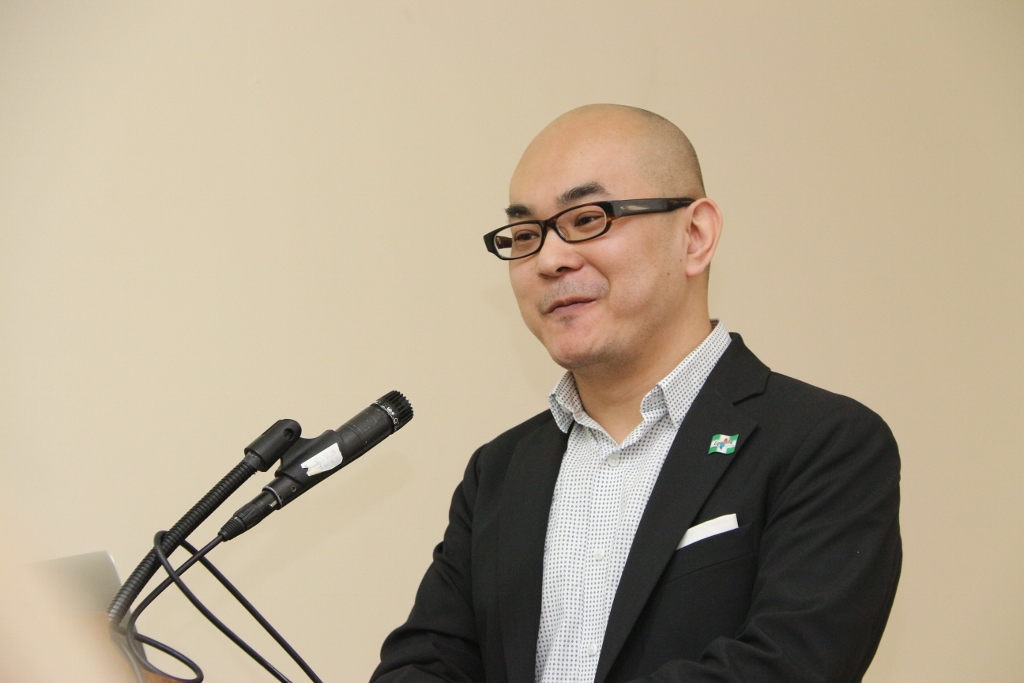
Mrs Chang, Yuan-Ting, Alternate Director, Urban Diversity and Mobility Research Center and Mr Chen, Chih-Wei who resides in London from the UN Sustainable Development Goals Advisory Council of Taiwan also spoke briefly. He was emphasizing connecting people and stressed the importance of conversation between men and women.
In Taiwan although many girls do get educated there is still the notion of Motherhood which prevails, and which monopolizes Femininity. 1988 the Gender equality was introduced in education.
Confucianism is still in the minds of Taiwanese people whereby women should be mothers and should not give that task to immigrant women. There is a prejudice towards immigrant women.
Margaret de Vos spoke of the importance of empowering women to participate in politics and economy. Without their participation we can’t build a sustainable world and sustainable cities. More than half the population in every country is female. It is important to use this latent working force and intellect. She gave answers to questions such as `What reasons are there to empower women to take part. What do you miss if they don’t participate`.
First, no person may be excluded the right to represent the people. Socially inclined reasons for diversity in political bodies are that the people should recognize themselves in those representing them in democratic bodies. It is not only important to have men and women, but also for instance ethnical diversity is important, so that people FEEL they are represented.
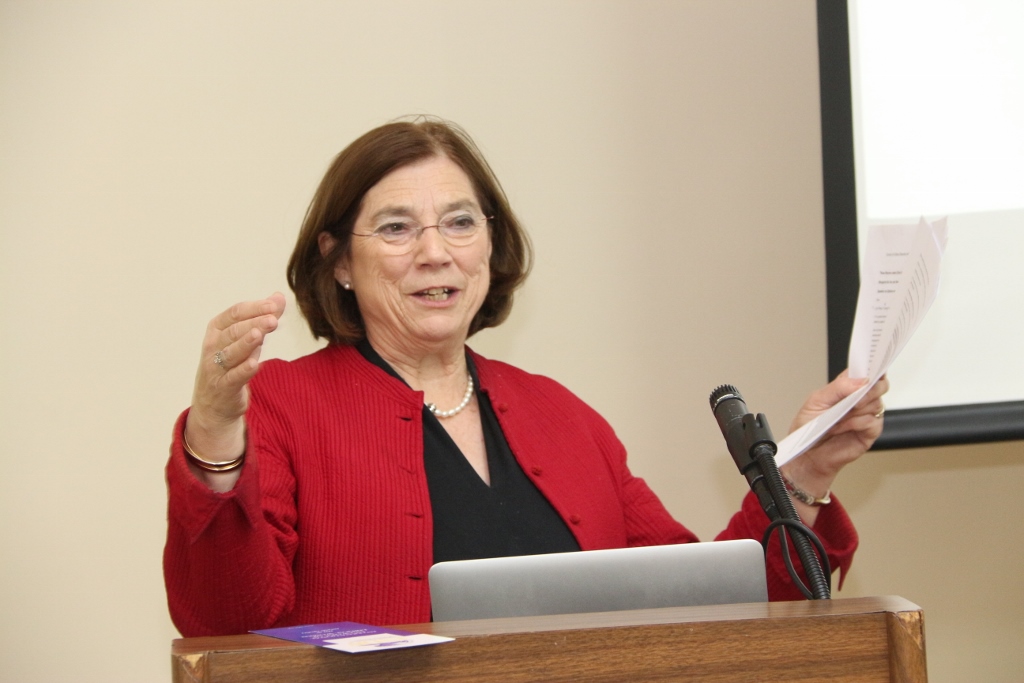 Second a more diverse parliament or government will address more of the concerns that apply especially to women. Diversely composed town councils and parliaments also know better what is going on in society. And likewise, the political agenda will reflect the questions which civil society finds important. SO, it often takes women to bring changes into legislation in favor of women and society. Political representation by women is also important to get rid of obstacles there are to get women elected. Also, for the knowledge they bring along in relation to themes which concern especially women or related to emancipation themes. Changes are necessary, but this means that if you want changes made you better change those who take the decisions as well. There is a critical mass needed to be able to make a difference and a change and that is 30 %.
Second a more diverse parliament or government will address more of the concerns that apply especially to women. Diversely composed town councils and parliaments also know better what is going on in society. And likewise, the political agenda will reflect the questions which civil society finds important. SO, it often takes women to bring changes into legislation in favor of women and society. Political representation by women is also important to get rid of obstacles there are to get women elected. Also, for the knowledge they bring along in relation to themes which concern especially women or related to emancipation themes. Changes are necessary, but this means that if you want changes made you better change those who take the decisions as well. There is a critical mass needed to be able to make a difference and a change and that is 30 %.
Mrs. De Vos also raised the question if political parties do better if they have women on the ballot list. She called upon this to be researched.
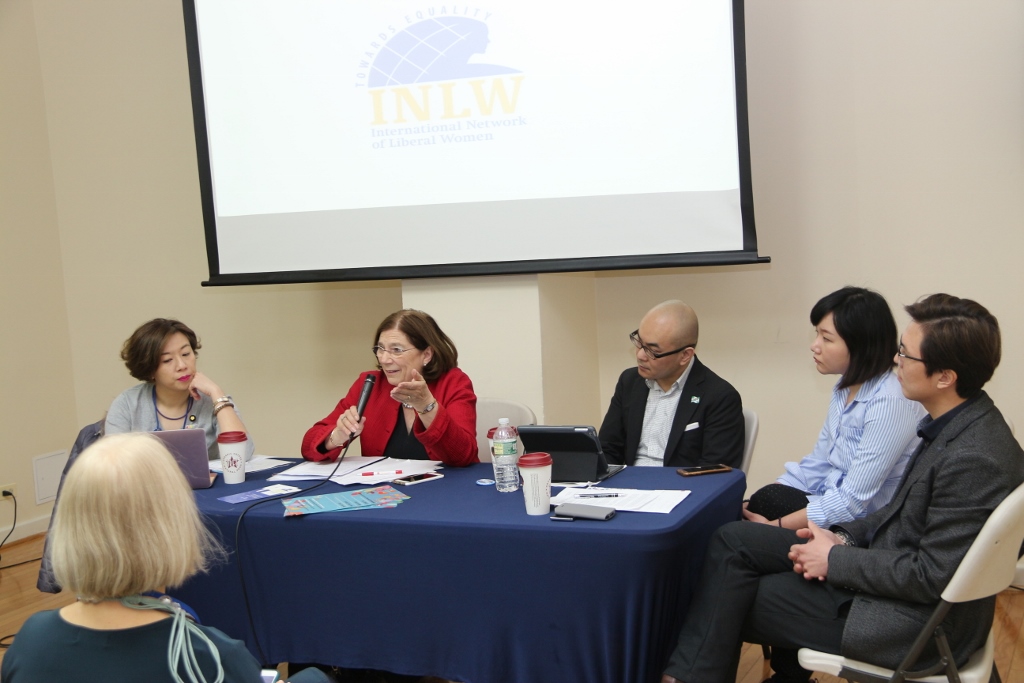 Have more working women changed cities? Active women in cities has changed the way of life in many cities. Just look at the burst of new restaurants in towns, where couples eat out very much more than in the past where the women were always at home preparing and cooking the meals. Empowerment of women and diversity in decision making is important to use all available talent.
Have more working women changed cities? Active women in cities has changed the way of life in many cities. Just look at the burst of new restaurants in towns, where couples eat out very much more than in the past where the women were always at home preparing and cooking the meals. Empowerment of women and diversity in decision making is important to use all available talent.
Albert Einstein: “The significant problems we face today cannot be solved by the same level of thinking that created them”. She mentioned that the brain architecture of men and women is different: Women think in web style and men in step thinking. Women considering more options to a problem and men, in general of course, thinking more via a linear causal path. Other positive traits can be intuition, mental flexibility, long term planning, creativity and keen imagination as well as other views on power. Working towards better decisions, while showing more patience, more listening qualities and showing more empathy, women tend to show a different kind of leadership. With all these positive reasons why are Women still not so empowered?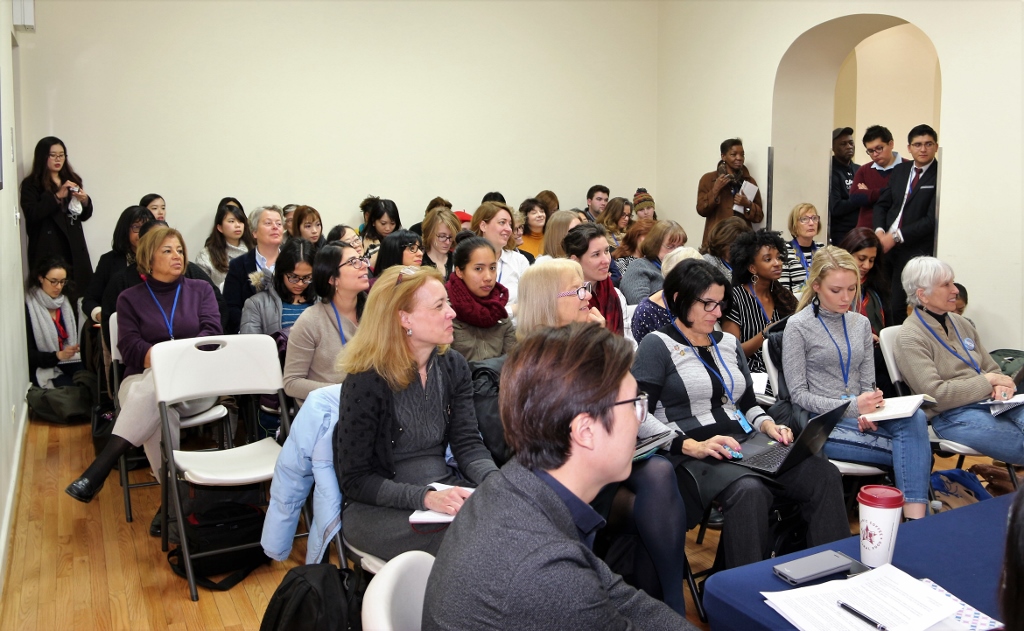
Mrs. De Vos went on to explain that women often wait to be asked or are triggered only after being encouraged. There is a social, political and practical necessity to have women on board in representative bodies like Town Councils and Parliament. How to get more women there? Get them over their modesty, teach them to present themselves with more confidence, while learning to exaggerate a little at least. Build up a network and within political parties learn to ignore any biased comments and use the competitive atmosphere for your own good.
Get to share the tasks in the household with the partner to be able to take on the extra work. And make sure you get women and especially also men to promote your candidacy. Go for it with a personal campaign. Think as party that 50% of the voters are women. So, widen the campaign with slogans and media presentation on subjects that appeal to women and present good solutions for these topics. Parties must give exposure to the women candidates! With the female vote one can win 50% of the voters! In Mrs. De Vos ’s experience in the Netherlands there are many women who only vote for women. So, you better have women on your lists!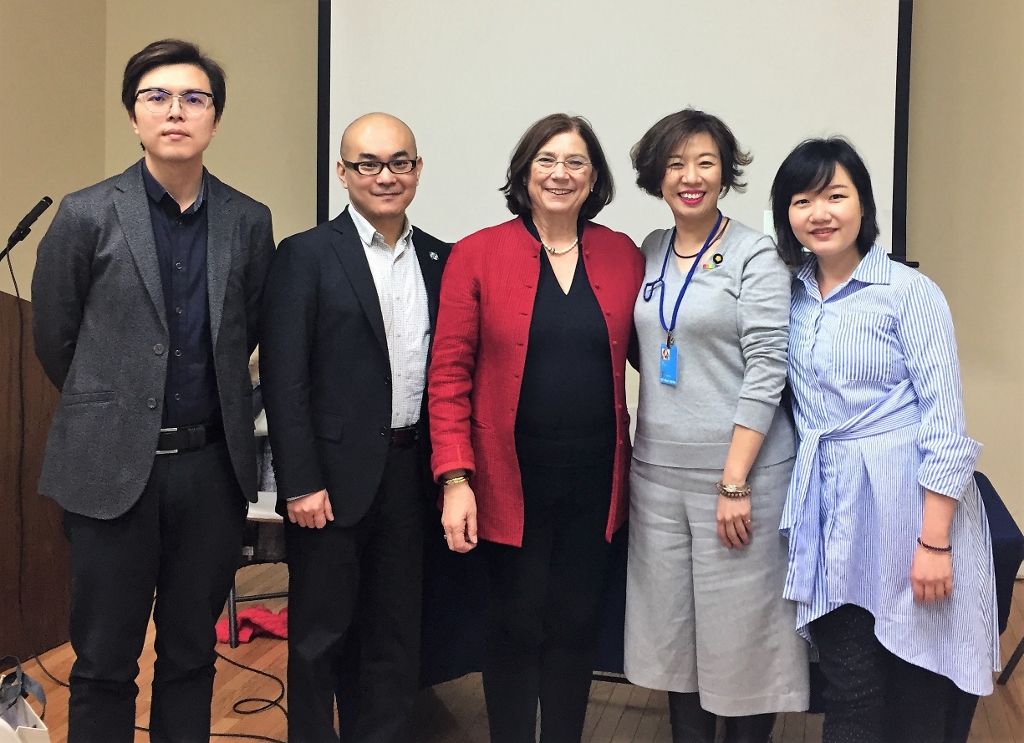
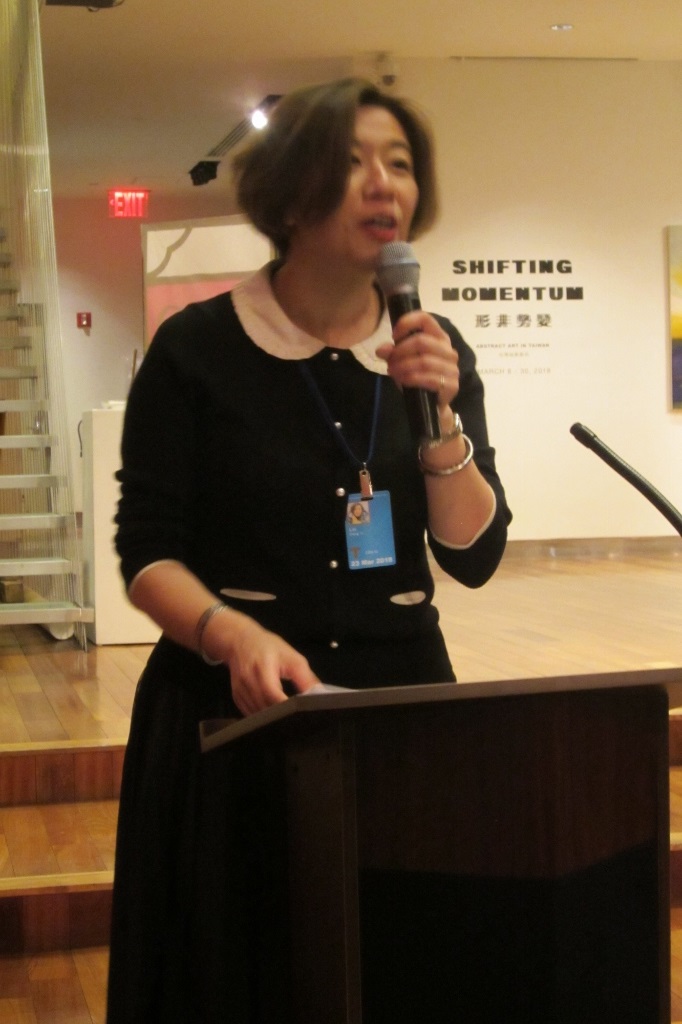 She concluded: “We must use all capacities, talents, creativity and knowledge of half of the population. Women then become more engaged in public decision making and it is a means of ensuring better accountability to women and making more and better decisions which will be beneficial for the country and towns! Diversity and empowerment of women is a question of common sense! The message is that Democracy without women is incomplete. Women’s adequate political participation is a fundamental prerequisite for gender equality and genuine democracy. Without the representation of women there is no Democracy”. Before the time was up a few questions were able to be asked, resulting is a discussion on whether women should help each other more instead of sometimes showing actions of jealousy and where Margaret found her information. The answer was: yes women should be more supportive of each other and promote each other more!
She concluded: “We must use all capacities, talents, creativity and knowledge of half of the population. Women then become more engaged in public decision making and it is a means of ensuring better accountability to women and making more and better decisions which will be beneficial for the country and towns! Diversity and empowerment of women is a question of common sense! The message is that Democracy without women is incomplete. Women’s adequate political participation is a fundamental prerequisite for gender equality and genuine democracy. Without the representation of women there is no Democracy”. Before the time was up a few questions were able to be asked, resulting is a discussion on whether women should help each other more instead of sometimes showing actions of jealousy and where Margaret found her information. The answer was: yes women should be more supportive of each other and promote each other more!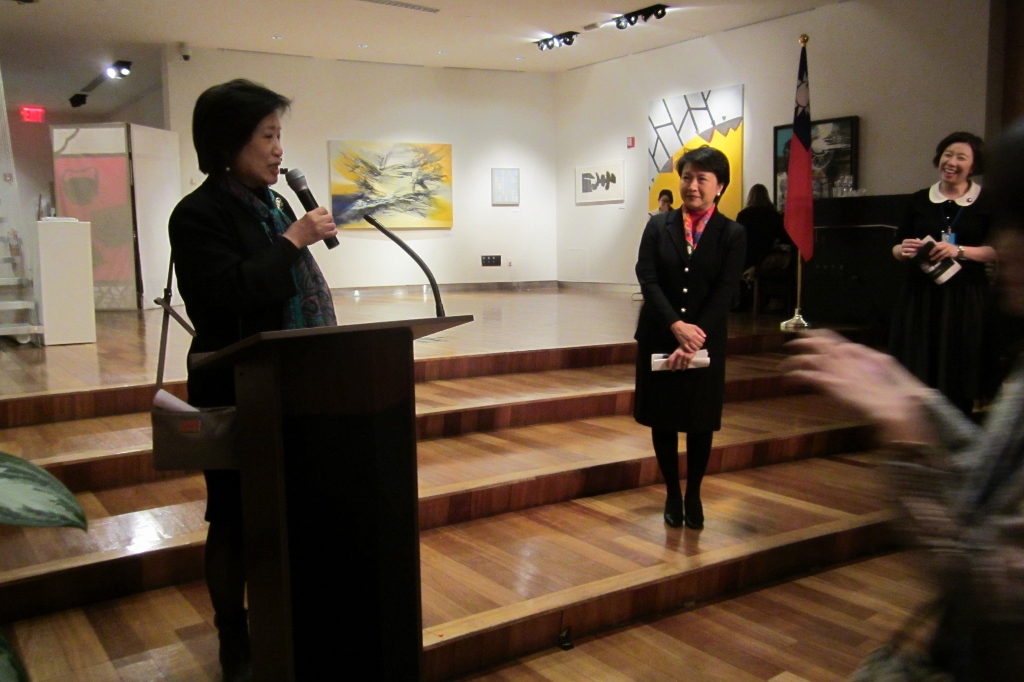
The next day the members of the Board of INLW were invited to the Taiwan building. Here our Board member Maysing Yang was one of the speakers during the evening.
[/read]
This year the ALDE party met at Amsterdam for its congress. The European Liberal Democratic family consists of more than 60-member parties
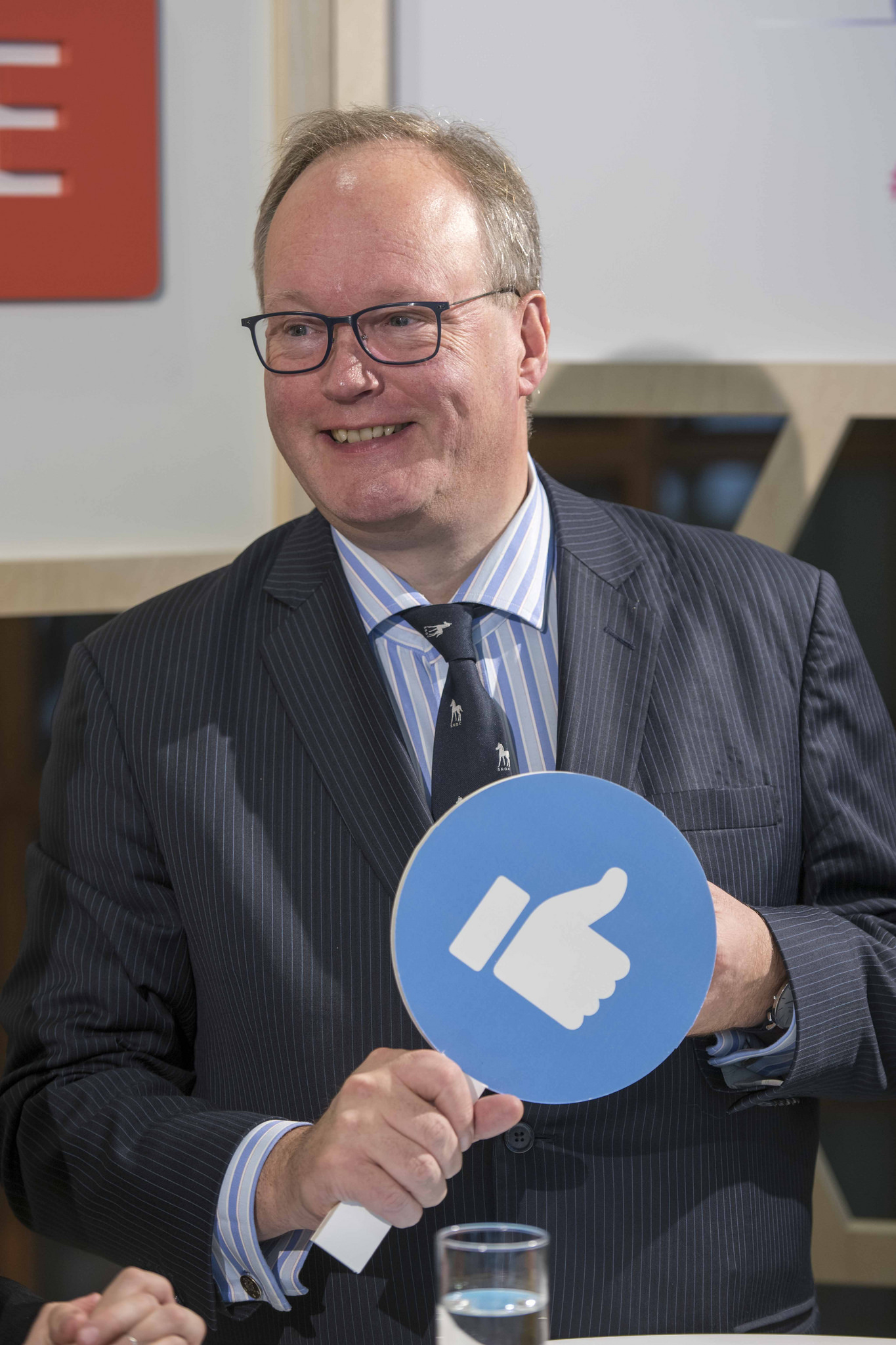
Hans van Baalen
across the continent and more than 50 members of the European Parliament who are part of the ALDE Group. Hans van Baalen MEP (Member of the VVD) has been president of the ALDE Party since 2015 and was re-elected during the congress.
During the afternoon VVD and D66 organized a debate on Fighting Populism.
In the discussion one of the elements was that many people have the feeling that politicians do not listen and don’t solve problems. Populists talk about fear, and often walk away from responsibilities but still they get voters all over Europe.
[read more=”Read more” less=”Read less”]
It really is a wake-up call for all the parties that democracy is not easy to keep and needs maintenance every day. We as liberals must fix problems. Not try to explain what is wrong but instead give solutions and implement them.
One approach is to address emotion, so provide personality and be authentic.
As Yair Lapid, Chair Yesh Atid from Israel said, “populism was already there in the 4th century according to Socrates”
So, we must learn to find a way to cope with populism in this instable world.
Antonio Roldán, MP from Spain, finds economic populism the most important problem.
His advice was:
- You need “reform champions”
- Equal opportunities for workers
- Anti-corruption
- Pro-market and pro-business attitude
- Gaining sovereignty through Europe
- Communicate well and value emotions
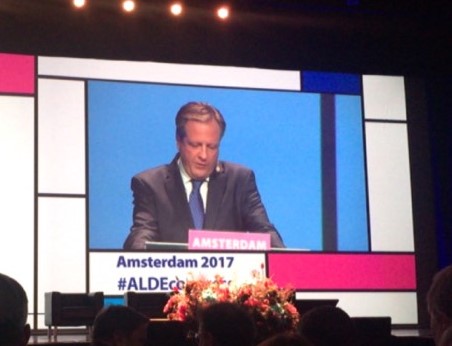
Alexander Pechtold
Also Chair Markus Loening, ALDE party Vice President, took the view that more emotion, not the policy, but the plans are important. The authentic attitude is necessary to affiliate with the problems: why, how and what are the words to use for understanding problems. It is important not to get into the frame of others. For many people the love of their country ultimately ending in patriotism is what we see in many parts of Europe. Instead of blind patriotism one can also ask the question that was asked so many years ago by Martin Luther King: what can you do for your country?
The official opening was done by Hans van Baalen MEP
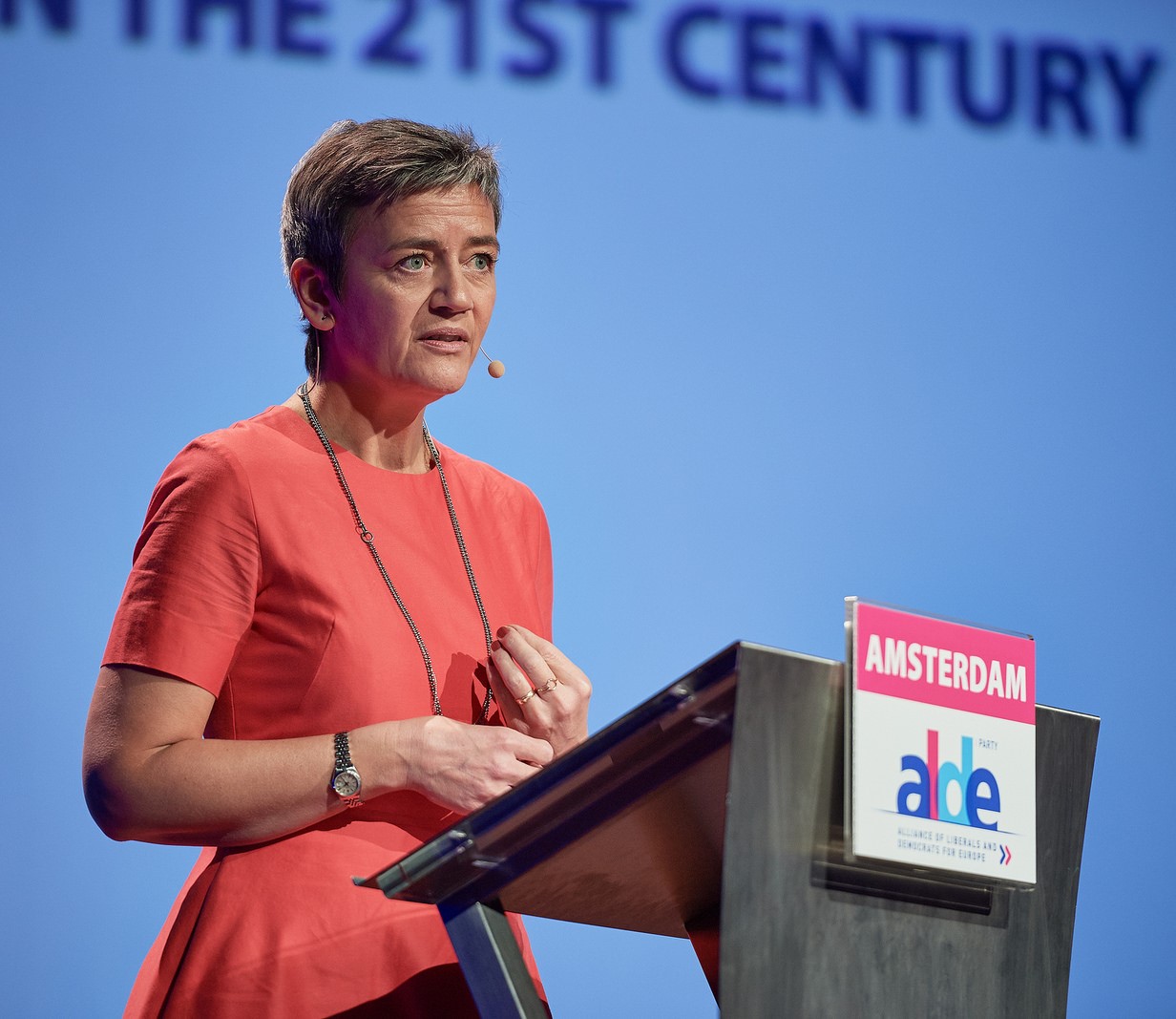
Margretha Vestager
and Party President and Guy Verhofstadt, MEP and ALDE group leader.
The key-note speeches were given by;
Alexander Pechtold MP and Party leader D66
Margrethe Vestager, European Commissioner for Competition, Prime Minister Xavier Bettel, PM Luxembourg.
This was followed by a debate on Renewing Democracy in the 21st Century. Some statements were given by the panel members Alexander Pechtold, Albert Rivera MP, Party leader Ciudadanos, Bart Somers, Alde-Cor-President and Margretha Vestager.
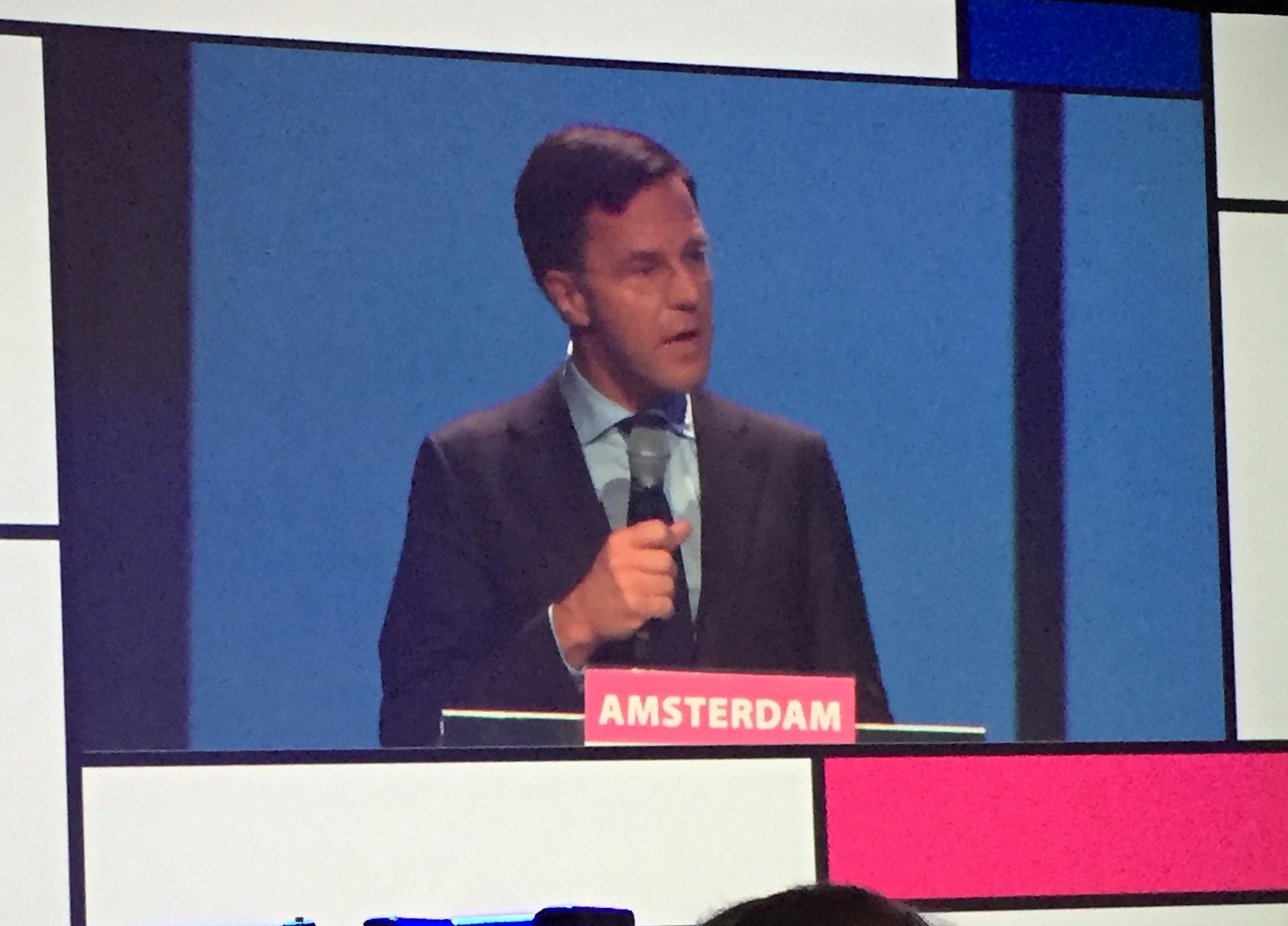
Mark Rutte
On Saturday Prime Minister Mark Rutte gave a speech (for the various speeches please go to www.aldeparty.eu) and Mark Rutte was one of the members in a panel discussion organized by the Friedrich Neumann Foundation:
“Renewal, Reinvigoration, Reform a Roadmap for a successful Europe to 2019 and beyond”.
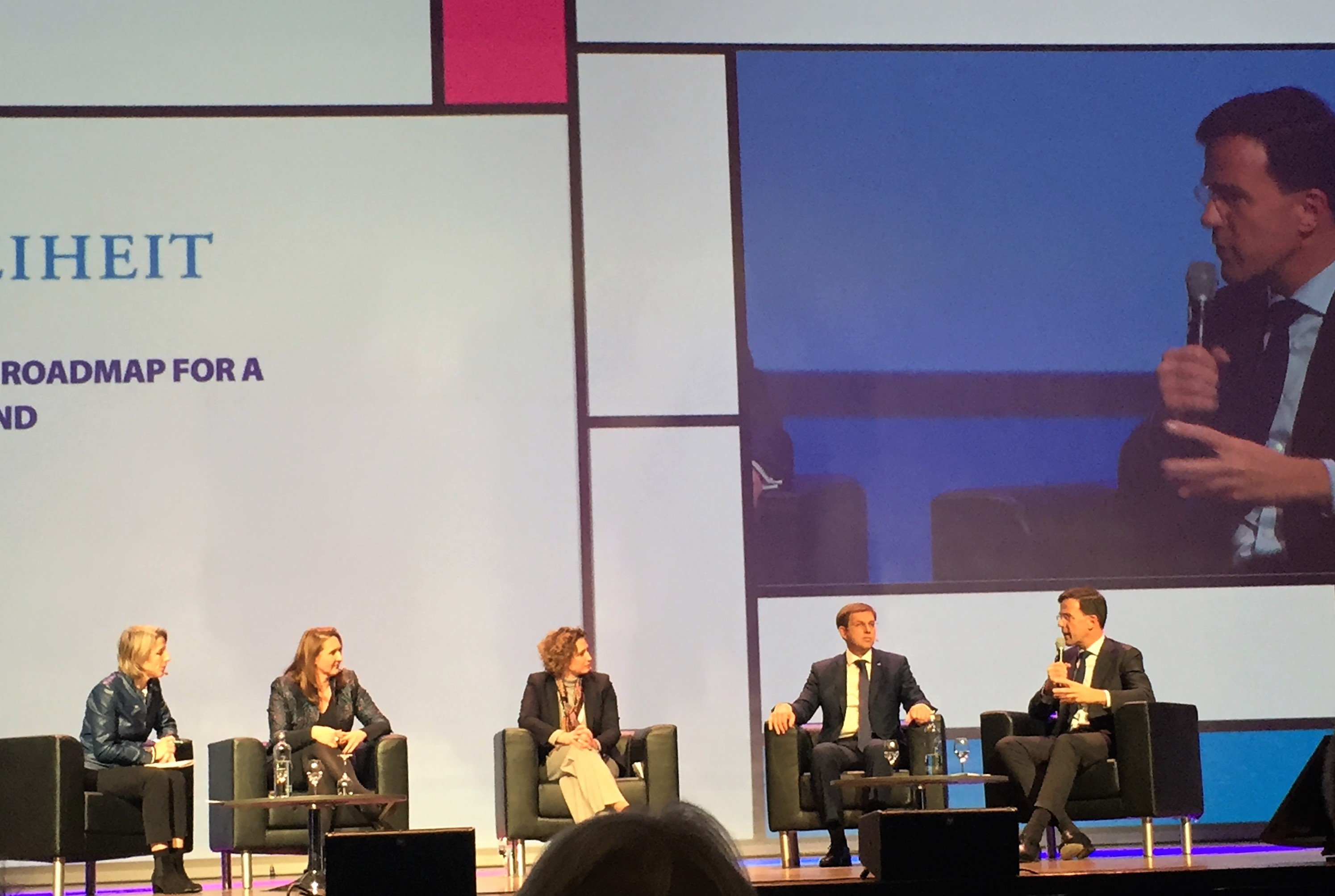
Corinne Hörst/ Gwendolyn Rutten/ Nicola Beer/ Christiaan Lindner/Mark Rutte
Moderator was Corinne Hörst; other panel members were Gwendolyn Rutten, Leader of Open VLD, Belgium,
Nicola Beer, FDP, Germany, Christiaan Lindner MP Party Leader, FDP Germany.
Gwendoyn Rutten said Europe is about the three P’s; Europe belongs to the People, it gives Prosperity with its free market and Europe has given Peace.
Europe has too many laws, so more focus is needed, we share ideas, but the migration problems are cause for chaos. So, a more active policy and a one border policy are necessary. European defense policy must be set up. Migration means that our identity is influenced. But we should recognize that we don’t have one identity but consist of many identities. Europe also has diversity and so many identities. Values, on the other hand, must be taught at school as well as freedom of speech and religion. We must stick up for our values. Values are not negotiable.
The core business of Europe is still: Safety and Jobs! And to invest in people and education.
There were more than 1400 Liberals present from all over Europe at this very interesting ALDE congress. Also, several members of INLW including three members of the Board, Margaret de Vos van Steenwijk (President), Lysbeth van Valkenburg-Lely (Treasurer) and Ruth Richardson (Member).
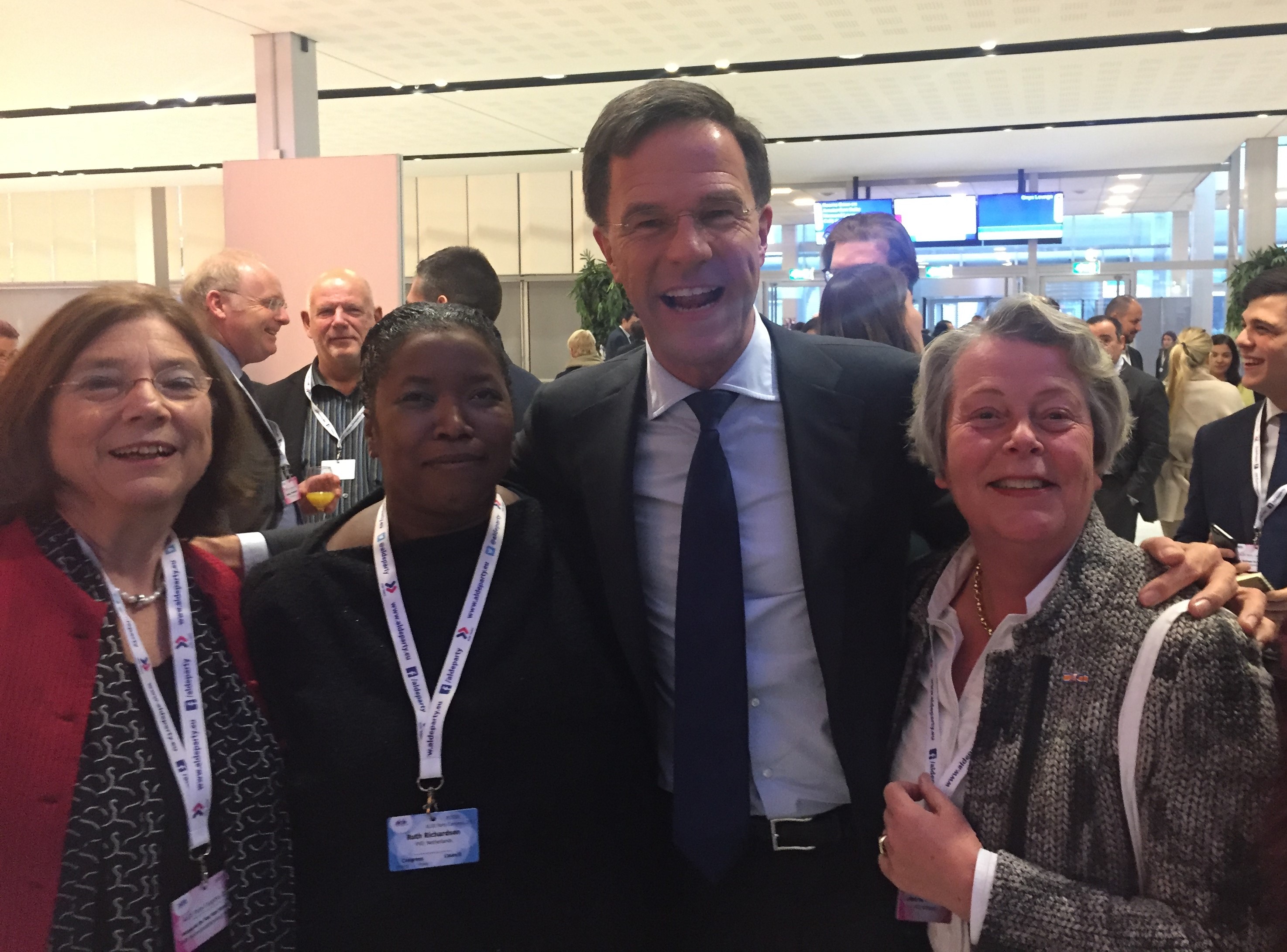
Board members Margaret, Ruth and Lysbeth with PM Mark Rutte
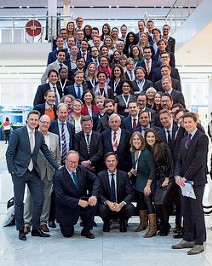
The Dutch delegation with PM Mark Rutte
Margaret de Vos van Steenwijk
President INLW
Lysbeth van Valkenburg,
Treasurer INLW
[/read]
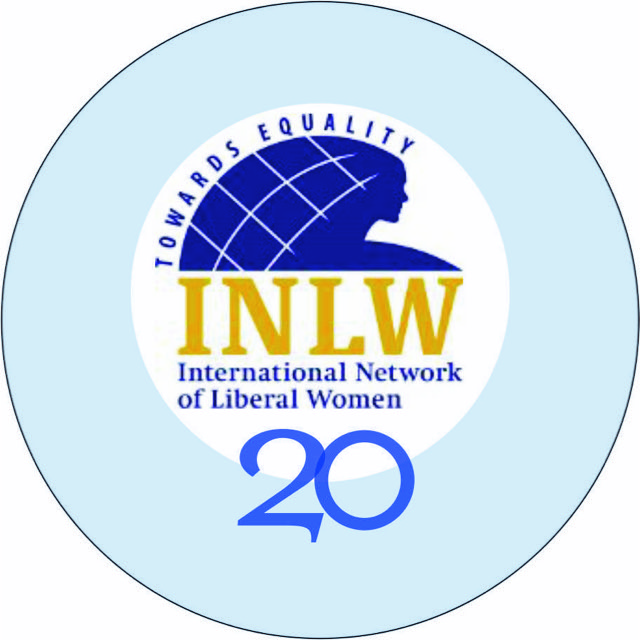
This year’s INLW General Meeting and Side Event took place in Andorra during the Liberal International Congress May 2017.
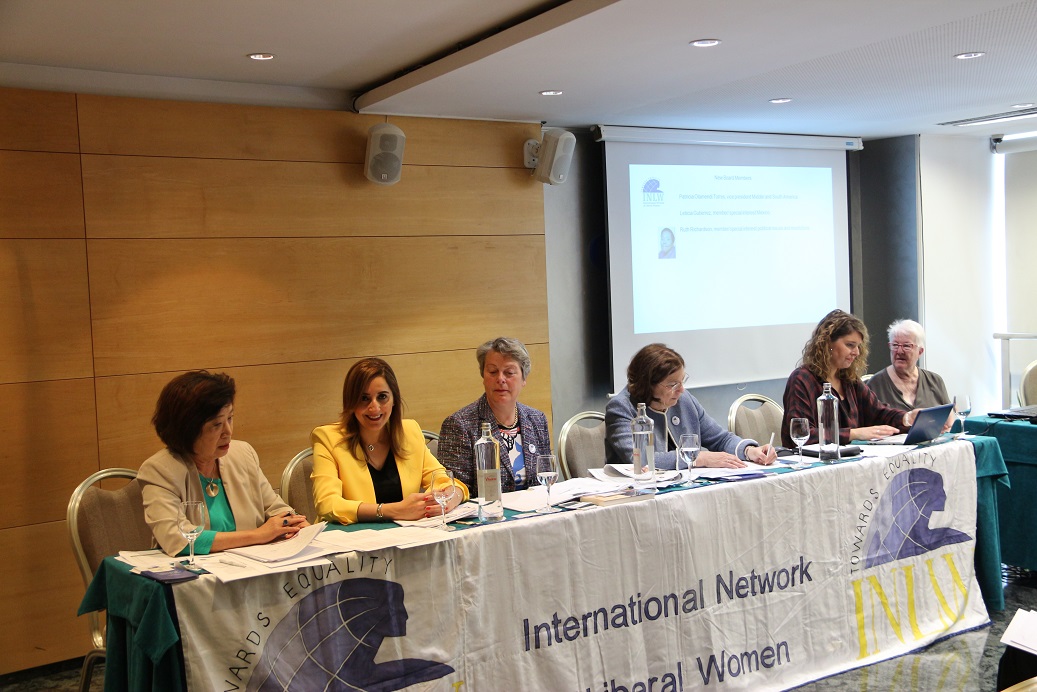
During the General Meeting, a few new members were appointed in the INLW Board.
We welcomed Ruth Richardson as Member of the Board. And we affirmed the appointment of Patricia Olamendi as Vice President of INLW for Latin America and Leticia Gutíerrez as Member of the Board. Both were present at the last GM in Mexico 2015, but had not yet been formally appointed by the GM.
We discussed the two resolutions that INLW had put to the LI Congress:
1: Child Abuse
2: Women water and Climate Change
Both were accepted unanimously on the last day during the LI Congress administrative session.
The Liberal Manifesto 2017, which was to be adopted by the LI Congress was discussed as far as the chapter dedicated to Women and Gender Equality is concerned:
“While the 20th century saw significant progress on the rights of women, inequalities for women, who represent more than half of the world’s population, still remain, especially in the uneven distribution of property and political representation, as well as the widespread use of violence against women and the denial of their sexual and reproductive rights. Some countries even retain these inequalities by law, denying women the right to vote, own property, benefit from education and enjoy personal freedom. We will therefore continue to fight fiercely for the rights of women.”
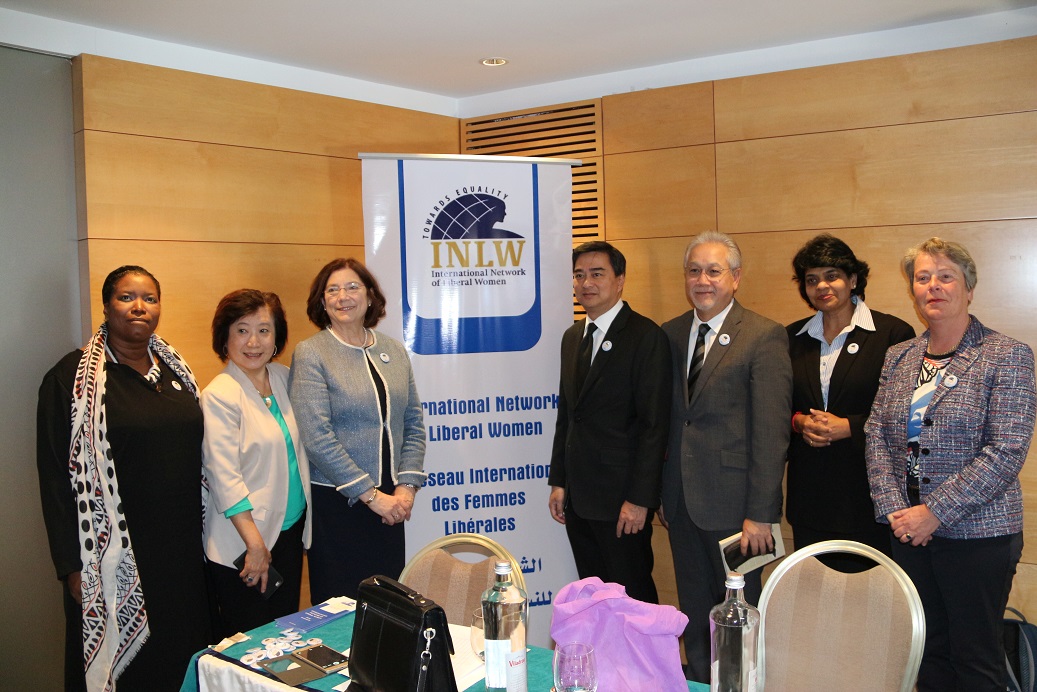 After the INLW GM we held a Side Event in which we celebrated our 20th official anniversary and discussed how women’s empowerment in Andorra is being achieved.
After the INLW GM we held a Side Event in which we celebrated our 20th official anniversary and discussed how women’s empowerment in Andorra is being achieved.
First though Joaquima Alemany Roca presented her book on “Women and Liberalism”.
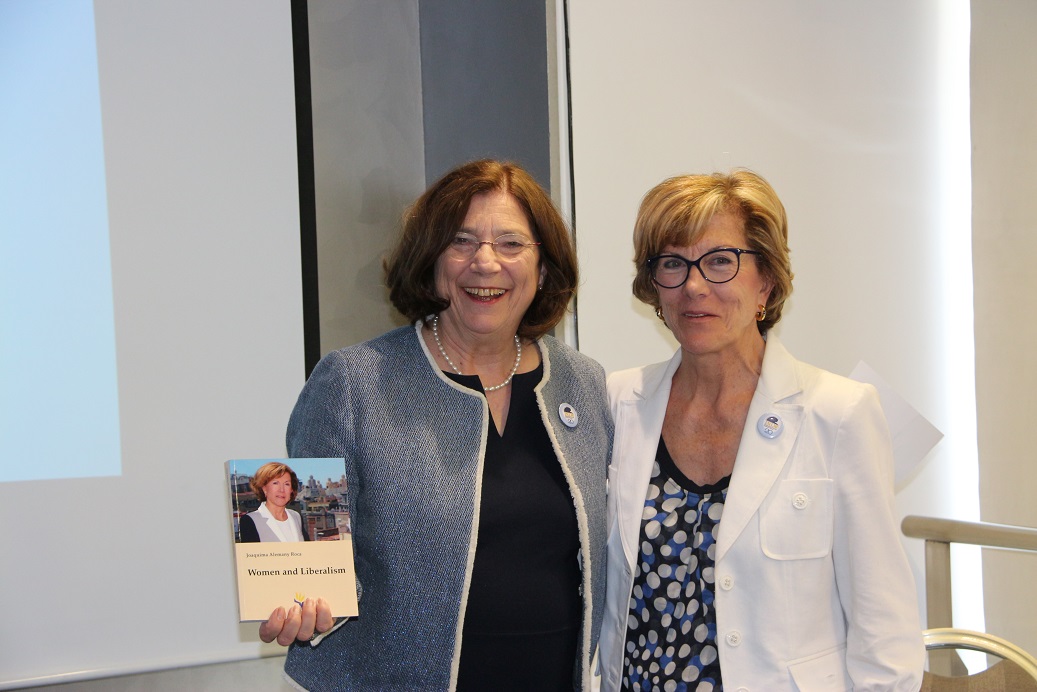 The first 2 copies were presented to INLW President Margaret de Vos van Steenwijk and LI President Juli Minoves.
The first 2 copies were presented to INLW President Margaret de Vos van Steenwijk and LI President Juli Minoves.
Margaret de Vos gave an insight of 20 years of INLW illustrated by some photos.
Carine Montaner, Andorra MP, spoke about the Economic Empowerment of Women in Andorra.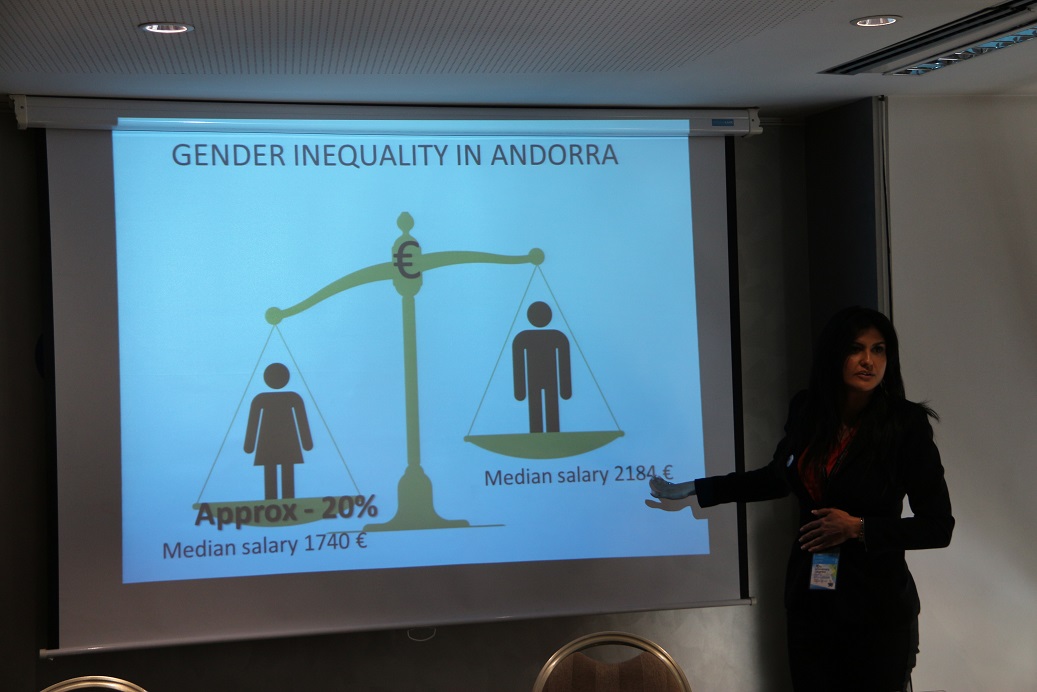
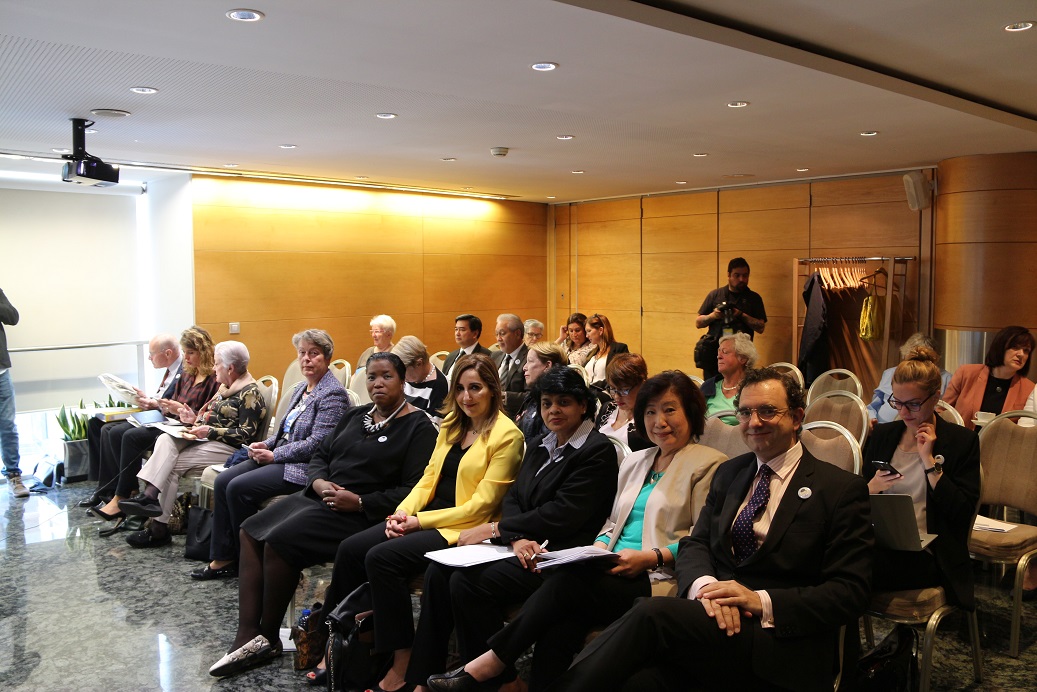
Also, Vice President Maysing Yang gave some details about the situation in Asia of empowerment of Women.
Starting up the discussion, CALD caucus Chair (Women’s Caucus of Council of Asian Liberals and Democrats), Mrs Jayanthi Balaguru took the floor to add her experience within CALD caucus.
During the lively discussion between the attendees and the panel, we dwelled on the fruitful relation INLW has had with Liberal International in its developm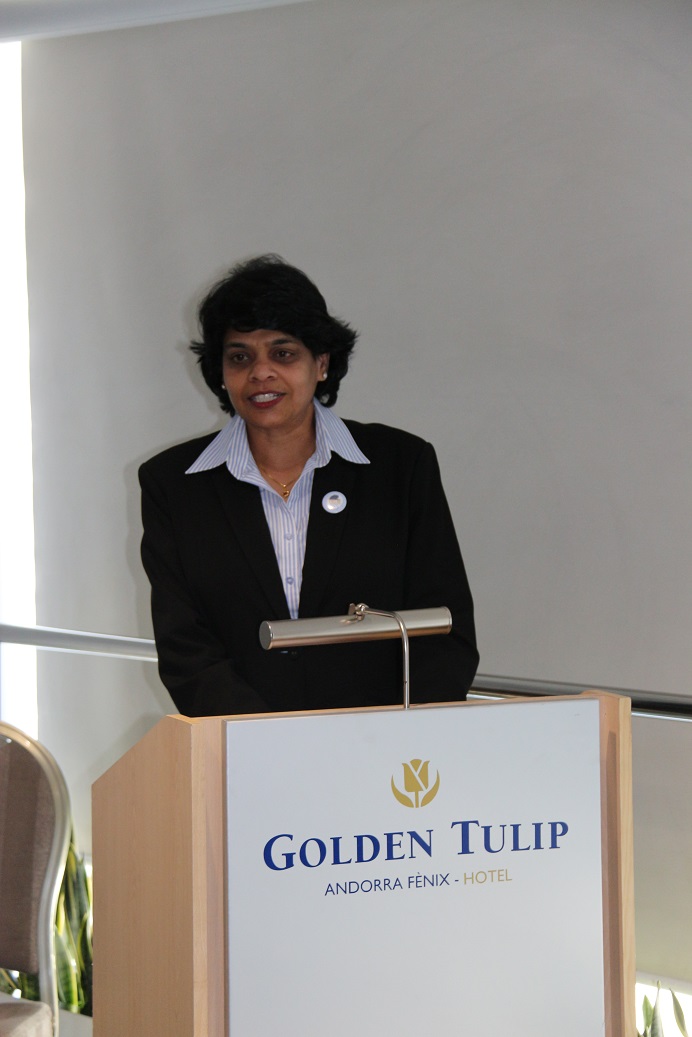 ent to the organization that INLW has now become. A very important fact therein was the recognition of INLW as an NGO in Special Consultative Status at the UN ECOSOC in 2003, for which INLW received invaluable support from now President of LI, Juli Minoves at that time Foreign Minister of Andorra.
ent to the organization that INLW has now become. A very important fact therein was the recognition of INLW as an NGO in Special Consultative Status at the UN ECOSOC in 2003, for which INLW received invaluable support from now President of LI, Juli Minoves at that time Foreign Minister of Andorra.
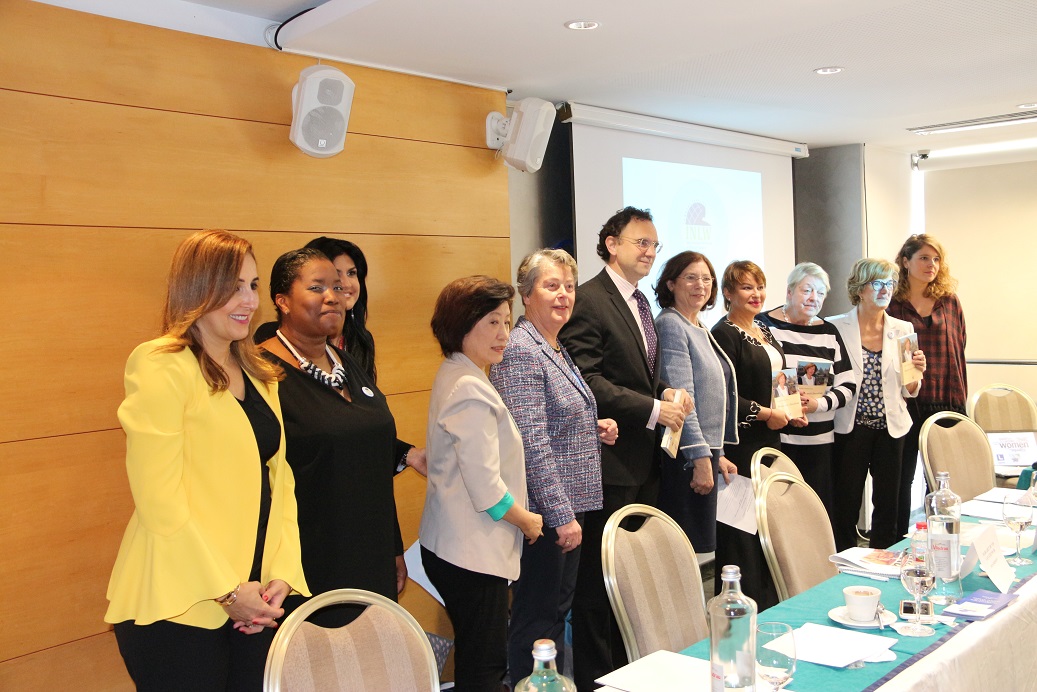 All in all it was made clear by the various speakers and the discussion, that the mission of INLW, “to fight the inequalities in the position of women in all fields and in all corners of the world”, is still very important!
All in all it was made clear by the various speakers and the discussion, that the mission of INLW, “to fight the inequalities in the position of women in all fields and in all corners of the world”, is still very important!

The Parallel Event was well attended by many Congress members.
Resolution number: 02
Submitted by: INLW (International Network of Liberal Women)
The Congress of Liberal International, convened in Andorra, on 20 May 2017
Noting that:
Climate Change has significant impacts on fresh water sources, affecting the availability of water use for domestic and productive tasks. The consequences of the increased frequency in floods and droughts are far reaching, particularly for vulnerable groups, including women who are often responsible for water management at the household level
Around the world, women are coming together to address their own needs for water and sanitation. Their strength and courage transforms communities who are facing a huge change in the climate. In huge parts of the world such as Africa, Asia and South America water is a constant problem
Pursuing the Paris Agreement and COP22 decision 21/CP22 on climate change and gender, water and sanitation are at the very core of sustainable development, SDG 6 is critical for people, planet and prosperity.
Climate change presents the biggest threat to development, and its widespread, unprecedented impacts disproportionately burden the poorest and most vulnerable. SDG 13 aims to take urgent action to combat climate change and its impact.
Considering as examples:
In Mongolia (Nomads), women, families and farmers are in constant need of water due to the dryness. In the summer, it is getting harder to grow and harvest grass and autumnal rains have virtually disappeared. Shepherds have not enough fodder to feed the animals in the winter, weakening the animals. Climate change is one of the factors responsible for this loss of livestock.
The impacts of climate change on the agricultural forestry sectors in Latin America are becoming increasingly worrisome.
In Nicaragua and in Ecuador climate change requires that women rethink ways of farming. The women face serious water supply problems, insufficient for harvesting crops.
In Peru recently the authorities declared the intense rains, overflowing rivers, mudslides and flooding the worst in two decades in Peru. Often women and children are the biggest victims through the extreme flooding, isolating hospitals and small villages and homes washed away by mudslides, resulting in many deaths of women and children. Then resulting in a bad health and sanitation situation with no latrines which hits especially women and girls.
Liberal International calls on all member parties and other liberal organizations to urge their governments around the world to:
Encourage gender-sensitive frameworks in developing policies to address climate change and reducing gender gap of climate change-induced social, economic and environmental vulnerabilities assisting developing countries in adaptation and mitigation practices through, inter alia, the Green Climate Fund.
Raise help and funds around the World and come together to help women and children
Invest in empowerment of women to change their surrounding world,
Implement and improve living conditions with measures to help women and children with access to clean water and sanitation, which helps sustain and prolong life of the poor population.
Prepare for and build women’s resilience and adapt to climate change impacts, increasing education and training opportunities for women to develop local resilience plans to address the effects of climate change; Create economic opportunities for small farmers in remote communities
Improve river basin management and save deltas (main)
Promote a balanced participation of men and women in climate change adaptation and mitigation efforts, including in governance positions
Enable a local environment supportive of sustainable and inclusive water resources management and economic growth, by promoting public private alliances and by improving gender balance in negotiation processes.
Resolution number: 03
Title: Child Abuse
Submitted by: INLW (International Network of Liberal Women)
The Congress of Liberal International, convened in Andorra, on 20 May 2017
Noting that:
World Health Organization (WHO), distinguishes four types of child maltreatment: physical abuse; sexual abuse; neglect and negligent treatment; emotional abuse; and exploitation
Child abuse can result in immediate adverse physical effects but it is also strongly associated with developmental problems and with many chronic physical and psychological effects, including
subsequent ill-health, including higher rates of chronic conditions, high-risk health behaviours and shortened lifespan.
The Convention on the Rights of the Child (UNCRC), of which Article 19 calls on all political parties to take all appropriate legislative, administrative, social and educational measures to protect the child from all forms of physical or mental violence, injury or abuse, neglect or negligent treatment, maltreatment or exploitation, including sexual abuse, while in the care of parent(s), legal guardian(s) or any other person who has the care of the child.
Child maltreatment is a global problem with serious life-long consequences
Despite recent national surveys in several low- and middle-income countries, data from many countries are still lacking
Considering it:
Worldwide because Child abuse occurs irrespective of gender, social standing, ethnicity, or religion. International child abuse statistics are difficult to come by due to the difficulty in keeping track of numbers and the hidden nature of some forms of abuse even in “financially sound” countries. Even though many countries keep no or inadequate records, politics are not doing enough. This is why we must raise awareness of the negative impact that violence and abuse have on women and children and rid society of abuse permanently.
Worldwide… because violence against children takes many forms, including physical, sexual, and emotional abuse, and may involve neglect or deprivation. Violence occurs in many settings, including the home, school, community and over the Internet.
Worldwide…because thousands or refugee children are being abused exploited and arbitrarily detained.
Worldwide…because in many countries children are used as target for emotional abuse and of neglect. Is known that child abuse happens constantly in war zones, in schools and in child marketing.
Worldwide…because child abuse happens in advertising, the food and beverage industry is marketing our children and youth to sickness or even death
The nature of international communication means that abuse occurs across international borders.
Calls on upon member parties and other liberal organizations to urge their governments around the world to bring this issue to attention: Raise the alert and protect our future generations from ritual and sexual abuse.
Pay special attention to and raise the awareness of child abuse in war zones.
Draw attention to child abuse in schools.
Let political parties intervene and put an end to inappropriate marketing to children
Draw attention to children used as targets such as in Europe, Syria, Iraq, Africa and other countries.
Non-profit agencies should work together in seeking funding that supports preventive effort.
Partner with national experts who can collect data to build the evidence base. Make use of data to demonstrate the need for increased funding for prevention programs.
Political parties to focus on the issue “child abuse” and keep it on the political agenda. WHO’s and International Society for Prevention of Child Abuse and Neglect (ISPCAN) Campaign on preventing child maltreatment.
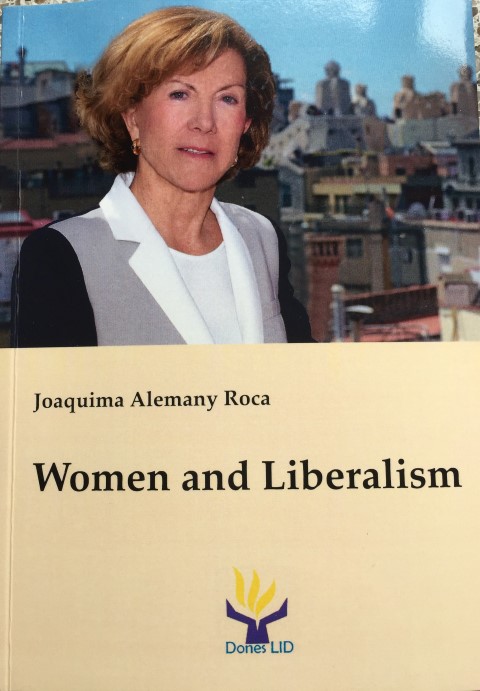 Joaquima Alemany Roca has presented her book “Women and Liberalism” during the 20th anniversary of INLW, which was celebrated on the18th of May 2017 in Andorra.
Joaquima Alemany Roca has presented her book “Women and Liberalism” during the 20th anniversary of INLW, which was celebrated on the18th of May 2017 in Andorra.
Joaquima is Past President of INLW, but was involved as a lawyer and mediator, councilor of the Barcelona City Council, Member of the Spanish and the Catalan Parliament and many other o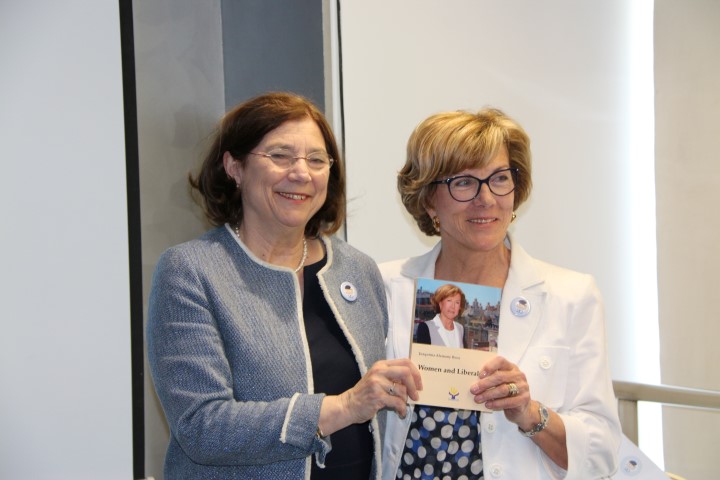 rganizations concerning women’s freedom and democracy. She has written several works on Women’s rights and has participated in relevant international conferences. She was one of the group of lawyers who participated in the drafting of the Penal Code Law.
rganizations concerning women’s freedom and democracy. She has written several works on Women’s rights and has participated in relevant international conferences. She was one of the group of lawyers who participated in the drafting of the Penal Code Law.
In her new book “Women and Liberalism” she describes and identifies the liberal values and principles that were born in Britain. This book enlightens us about the struggle for women’s equality going back for centuries.
Historical or Classical Liberalism has helped to prepare the ideological foundations of Western Democracies of today. The Liberal values and principles have led to new ways of doing politics, away from the totalitarian and dictatorial processes.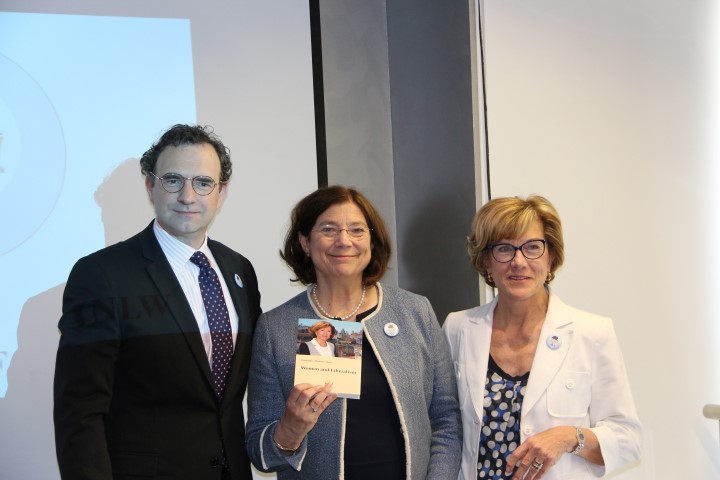
Juli Minoves/ Margaret de Vos/ Joaquima Alemany
President LI/ President INLW
We congratulate Joaquima on the presentation of her book.

18th May 2017 at Hotel Golden Tulip Fenix, Prat Gran 3-5, Andorra at 10.30 a
“20 YEARS INLW” And how is women’s empowerment in Andorra being achieved?
10.30 Opening of INLW panel event
Margaret de Vos van Steenwijk: Presentation 20 Years INLW
Carine Montaner, Andorra MP; Economic Empowerment of Women in Andorra,
Joaquima Alemany, Past President; Presentation of book
Maysing Yang, Vice President Asia; situation in Asia,
Panel Discussion
Followed by discussion with the speakers and among others Khadija El Morabit, Vice President MENA
Hereby we are sending you all the documents for our INLW General Meeting to be held in Andorra on May 18th 2017 at 9 am in Hotel Roc Blanc.
If you are considering coming to Andorra to participate at our General Meeting as well as at the Liberal International 70th Anniversary Congress you should inscribe for the Congress before 4 may it says on the inscription site! If you would like to participate as a delegate of INLW please let me know as soon as possible as there is a limit to the amount of delegates allowed per LI member (INLW can have 10 delegates).
For more information on the Congress please look at the LI website, www.liberal-international.org.
Continue reading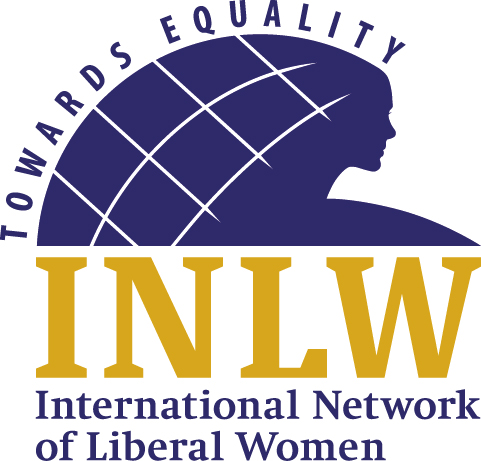
 Visit our Facebook page
Visit our Facebook page